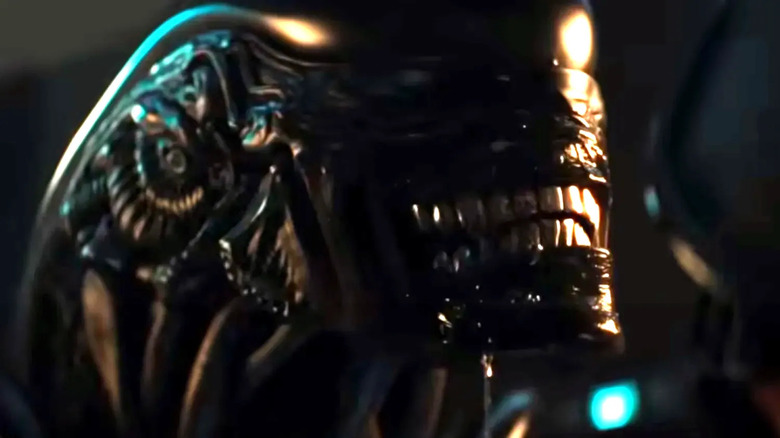Alien: Earth's Season 1 Finale Promises Something Fans Have Wanted For A Long Time
One of the things that makes the "Alien" series so attractive is how it's never been lacking in ambition, imagination, and inventiveness. Despite a number of recurring tropes and familiar elements (chief among them the titular Xenomorph), no two "Alien" films are exactly alike, which is a tribute to how artist-driven the series is.
However, there is one odd quirk of the "Alien" franchise: although there have been three main feature films, two spin-off movies, and one TV show produced since 2004, these have primarily been set before (or just after) the original "Alien" for the last 21 years, and none of these projects have acted as a true sequel. This is all despite 1997's "Alien: Resurrection" leaving the door wide open for future adventures in the universe, with the film allowing Ellen Ripley (Sigourney Weaver) to finally arrive on Earth in the year 2381. Granted, all of the prequel films that have followed have further enriched the franchise and its lore, so it's not like the series is narratively stuck. Still, it's strange that we've spent this much time in the pre-"Alien" years.
Noah Hawley's "Alien: Earth" does make good on something the franchise promised all the way back in '97, which is to tell a Xenomorph tale set fully on a future version of our planet. The show is set in the year 2120, which is just two years before "Alien" takes place. Yet nothing about the series yet suggests that Hawley and company are trying to remain rigidly faithful to the franchise's canon, nor are they treating the show in a similar fashion to George Lucas' "Star Wars" prequels. Instead, "Earth" seems intent on blazing its own trail — something the season 1 finale appears to double down on, as the "Lost Boys" hybrids have now taken control of the Neverland facility, with the remaining humans held hostage and a coterie of creatures (including two Xenos) under their control. Given this setup, the series' lore, and Hawley's past TV shows, it's entirely possible that "Alien: Earth" could end up acting as both a prequel and a sequel series.
How the films shape the future of Alien: Earth
Of course, the most likely scenario for the second season of "Alien: Earth" is that it will simply pick up soon after the first season leaves off, and thus it's very easy to assume that the entirety of the show will remain a prequel. However, there are some pre-established elements of the "Alien" timeline which, despite the show playing fast and loose with lore, feels like Hawley won't want to outright violate. Chief among these is that, in the initial trilogy of "Alien" films, the Weyland-Yutani corporation is desperate to get its hands on some Xenomorphs. If "Earth" continues the competitive, almost war-like relationship between Prodigy CEO Boy Kavalier (Samuel Blenkin) and Yutani (Sandra Yi Sencindiver), surely this implies that the latter will never successfully obtain one of the Xeno specimens currently loose in Neverland.
Additionally, though "Earth" appears to be following the "Alien" template (with a bit of Michael Crichton thrown in) where the best laid plans of an evil corporation go horribly wrong, it can also be assumed that any outbreak of the Xenos or the other deadly alien species in the show won't be worldwide. After all, if that happened then why would Weyland-Yutani devote so many resources to retrieving the body of the Xenomorph from the Nostromo (as seen in "Alien: Romulus")? Furthermore, wouldn't the people on Earth's Gateway Station be more understanding of Ripley's story when she's found in 2179 at the beginning of "Aliens?" Certainly, all this means that "Alien: Earth" can't let its beasties run loose on the planet all that much, not without the possibility of an airtight cover-up (as in, presumably, the "Alien vs. Predator" films) or some sort of "Men In Black"-style neuralyzer technology.
Could there be a time jump at some point in Alien: Earth?
This is all speculation, naturally, but things get interesting when one considers what the future of "Alien: Earth" might be, given Hawley's past work. Sure, the rest of the series could be largely confined to Neverland, with all the creatures (and most of the characters) ending up dead at the end so as to preserve the franchise's timeline. Yet, Hawley doesn't seem like the type of writer who'd be alright with such constraints, and the first season of "Alien: Earth" has demonstrated that it's interested in a wide variety of topics that are both old and new to the series. Additionally, given the title of the show, it seems unlikely that the characters are going to take a voyage to another planet, at least not for very long. So, if the series must remain on Earth, but events cannot expand beyond Neverland, what might some other possibilities be?
One answer could lie in the concept of the hybrids themselves: once-human teens transplanted into synthetic bodies. We've already seen that the bodies can be repaired and revived under certain conditions, and we know from the franchise's lore that synthetics live much longer than humans do. So, what's to prevent Hawley from utilizing a time jump during the show? He's done a version of that sort of thing before, in season 3 of "Legion." His "Fargo" series jumps all around in terms of time period, with each season of the anthology series being set in a different year. Given Hawley's track record, it's within the realm of possibility that he's not planning for "Earth" to take place solely in 2120, and he's got a group of protagonists who don't have to be confined to a particular era given their pseudo-immortality. What's to stop the series from jumping forward to a post-"Alien," post-"Romulus," or even post-"Resurrection" time period?
Only time will tell, and even if we jump forward, we probably won't be seeing Ripley again. Still, never say never, as there's no question that the "Alien" series remains enticingly unpredictable.


